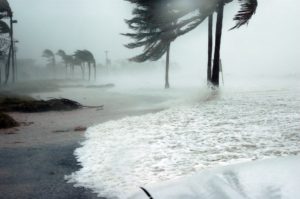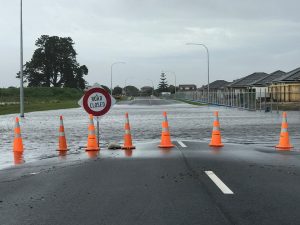 Courtesy of iii.org
Courtesy of iii.org
Floods occur in every region and 90 percent of all natural disasters the United States involve some type of flooding. Minimize the damage and losses from a flood by taking these precautions.
Understand flood watches and flood warnings
There are different alerts for floods, depending on the type of and immediacy of the potential danger. Educate your family and yourself about your community’s flood warnings:
- Flood watches are issued when rain is heavy enough to cause rivers to overflow.
- Flood warnings describe the severity of the situation and indicate when and where the flood will begin.
- Flash flood watches are issued when heavy rain is occurring or is expected to occur.
- Flash flood warnings are issued when flooding is occurring suddenly. In the event of flash flooding in your area, move immediately to high ground.
Take practical measures to protect yourself, your family and your property
Preparedness is paramount when it comes to encroaching floodwaters. Here are precautionary steps to take well before the threat of a flood is upon you.
- Have an evacuation plan for your family in case the authorities officially evacuate your area. If you have pets, create an evacuation plan for them, too and make sure to develop a “what if” process for communication in case family members become separated.
- Maintain a supply of emergency provisions, such as flashlights, batteries, a battery-operated radio, a first aid kit, medication, sturdy shoes, emergency food and water, cash and credit cards.
- Maintain a supply of building materials and tools so you can fortify your house from a storm. These would include plywood, plastic sheeting, nails, hammer, shovels and sandbags.
- Install a backwater prevention valve, so floodwater doesn’t back up into your sewer drains.
- Make a home inventory listing all of your possessions to help facilitate the claim filing process if your belongings are damaged or destroyed.
- Locate switches for gas, electricity and water and know how to shut them off. In the event of an evacuation, you’ll want to turn these off before you leave.
- Purchase flood insurance. Your standard homeowners policy doesn’t include flood insurance, so if your area is at risk, you may want to consider getting it through the National Flood Insurance Program. Know that there is a 30-day waiting period before flood insurance takes effect, so don’t wait.
For more preparedness tips, handy checklists (including ones you can personalize yourself) and evacuation planning advice to cover a variety of disasters, get the I.I.I.’s Know Your Plan app. It’s a great tool to help get you and your family—including pets—organized and ready to act more quickly if an emergency strikes.
Next steps link: Think you’ll need financial protection against flood damage? Read these facts about flood insurance.



